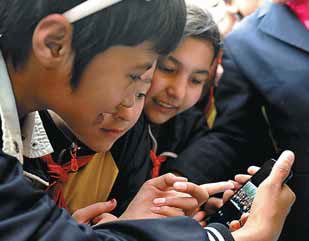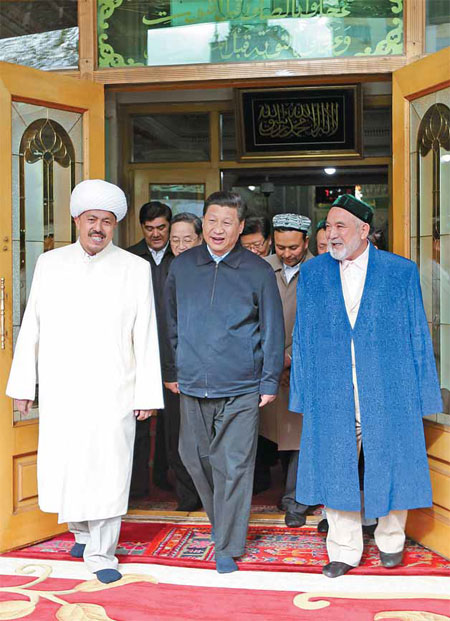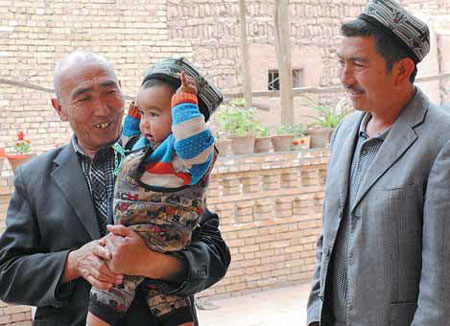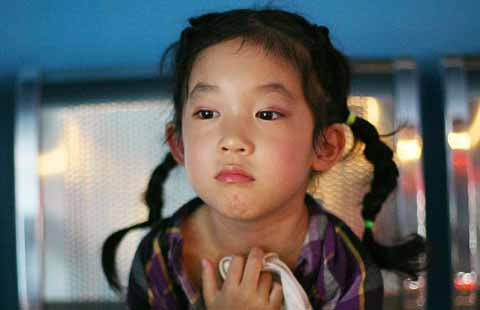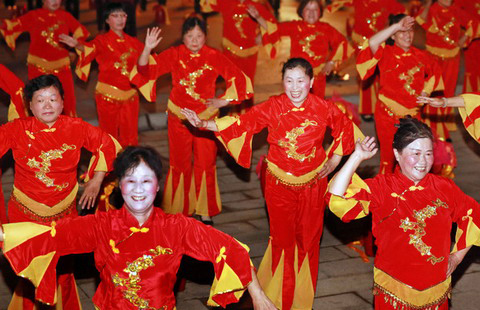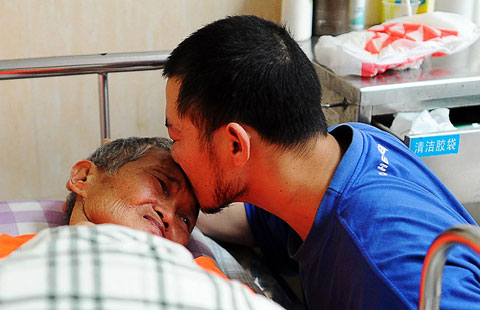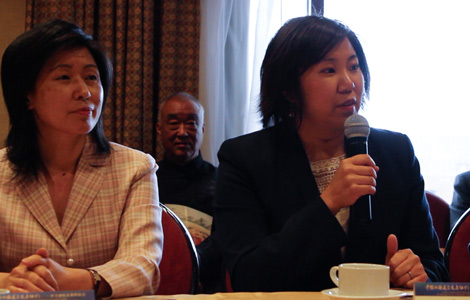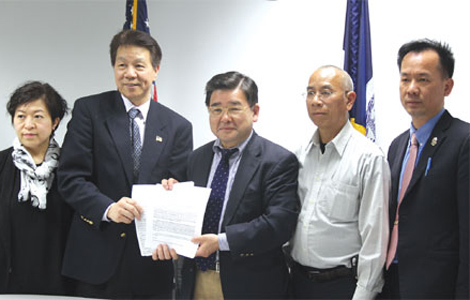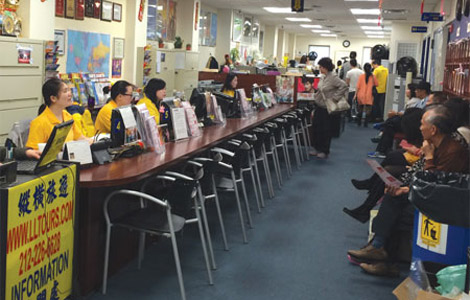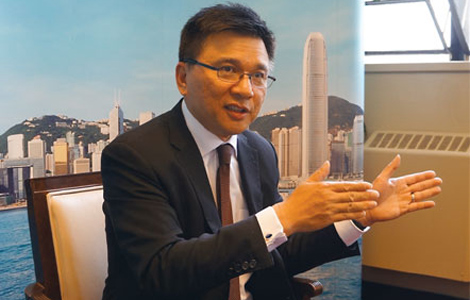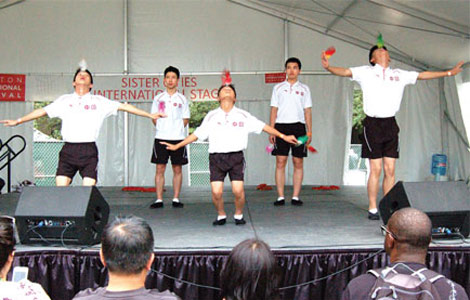Xi spreads the word on fighting terror
Updated: 2014-05-06 07:21
By Cui Jia (China Daily)
|
||||||||
Preventive measures stressed during the president's Xinjiang visit, Cui Jia reports in Kashgar and Urumqi.
Sweat mixed with dirt streamed down the face of Arken Tulak, chief of the Naizerbage police station in the city of Kashgar in the Xinjiang Uygur autonomous region.
The 43-year-old had just taken part in routine training with his men, all armed with long batons and shields, in the middle of a mini sandstorm.
"In three quick moves, we can disarm a knife-wielding terrorist. We displayed these unique combat maneuvers to President Xi Jinping and he seemed pleased," said Arken Tulak, speaking the day after Xi visited the police station.
Xi spent four days in Xinjiang, starting his visit in the southern city of Kashgar on April 27. It was his first visit as president to a region that has seen a sharp increase in terrorist attacks.
The most recent, which left three people including the two attackers dead and 79 injured, targeted Urumqi, the regional capital, on Wednesday.
The two assailants stabbed people at the exit to the South Railway Station before detonating explosives.
Officers from a nearby police station arrived at the scene less than a minute after the explosions, thanks to their improved training program.
Police published the identity of one suspect, from Shaya county in the southern Xinjiang prefecture of Aksu. They also launched investigations into the suspects' backgrounds and said the number of terrorist cells formed among family members has been rising.
Xi inspected the armed police and People's Liberation Army troops based in Kashgar as soon as he arrived in the city. He urged them to improve the joint anti-terrorist arrangement and conduct exercises aimed at neutralizing terrorist networks, Xinhua News Agency reported.
Xi, who is also chairman of China's Central Military Commission, ordered the PLA to play a stronger role in combating violence and in assisting the local government to deliver a "crushing blow" to terrorists.
The next morning, he stepped into Arken's police station on the outskirts of Kashgar city. "That Xi decided to come to Kashgar first shows that he attaches great importance to counterterrorism measures, especially at the grassroots level. After all, everything is based on social stability," Arken said.
Xi said that as China's westernmost border region, Kashgar prefecture is on the front line in the fight against terrorism, a situation he called "grim and complicated".
Li Wei, director of the Anti-terrorism Research Center at the China Institutes of Contemporary International Relations, said foreign terrorist groups based in countries neighboring Xinjiang have infiltrated the local community, so terrorist activities will remain a threat for some time to come.
"There is no doubt that China must strike hard against terrorism, but we can't expect the attacks to just stop because of that. As Xi said during his visit, fighting terrorism is a long-term mission ... the attack in Urumqi has proved that," Li said.
Grassroots police stations are "fists and daggers", Xi told Arken and the other officers. Given that police stations and officers have been the targets of recent attacks in the region, he urged them to better protect themselves.
The 33 officers and 58 assistant officers at the Naizerbage station serve a district that has a population of more than 60,000. Officials at the station said that in recent years the local police have smashed a number of terrorist cells that were plotting violent activity.
"Crime prevention is crucial because it saves people's lives. To that end, we have intensified our physical and combat training," said Arken, who had been working and training nonstop for more than two weeks.
'Brothers and sisters'
During his visit, Xi made several tough remarks that stressed his determination to fight terrorism. At the same time, he showed a softer side to the people, whom he described as "brothers and sisters", and emphasized the need for unity in the face of a common enemy.
"Xi sat right here when he came to my house," Abudulkeyoup Rozi said, as he repeatedly tapped a spot on a carpet-covered "brick sofa", a traditional feature of Uygur courtyards.
The 36-year-old from Ayagemangan village in Kashgar's Shufu county had never imagined that he would meet Xi, who, like all distinguished guests, was offered a traditional Uygur flat hat as a gift.
"My father froze momentarily at the door," Abudulkeyoup said with a laugh, as he watched Rozi Memet play with his 18-month-old grandson. "Xi stroked his face, like this," said Rozi, placing his hand on the baby's plump face. "He was so warm and friendly."
Later, Xi walked around the typical rural Uygur house with its large courtyard covered with grape trellises. "He asked what kind of plants we grow in the backyard. I said they were sweet melons and I told him I'd definitely have shared one with him if they were ripe. Xi smiled and said maybe he would visit us again to taste them," Abudulkeyoup said.
His 63-year-old father said Xi quizzed him about the effectiveness of government policy. "Xi sat down and asked if the policies designed to benefit the villagers had all been implemented," he said.
Rozi told Xi that he had been ill last year, incurring treatment costs of 18,000 yuan ($2,900), but that he had only had to pay 10 percent of the total because he's a member of a government-backed local health insurance program.
Abudulkeyoup earns a living by renting out four tractors to local farmers. The total cost of the tractors was 126,000 yuan. Abudulkeyoup paid 100,000 yuan, and the remainder came through government subsidies for agricultural machinery - another policy designed to help people in Xinjiang.
"I'm going to buy another tractor this year because more people said they need to use them," he said. "My goal now is to buy a car and take my father touring around China. Also, I want to see my son to go to university," he said, smiling. "Before Xi left he said he was pleased to see the family's high standard of living and wished us an even better life in the future. He said that's the government's goal."
Meeting 'Uncle Fruit'
Xi also paid a visit to a fruit industry park in Urumqi, operated by Xinjiang Fruit Industry Group, and tasted the dried fruit produced by local farmers.
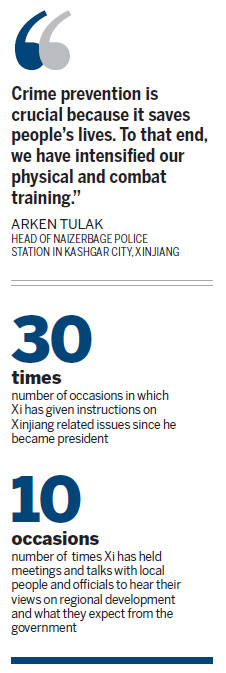
"He really cares about how local farmers can raise their incomes through cooperation with the company," said Yuan Zhenting, the group's chairman, who accompanied Xi on his tour of the complex.
Xi apparently commented that apricots that dry naturally on the treetops have a special flavor and that dried dates from Ruoqiang county in Bayingolin Mongolian autonomous prefecture taste especially good.
Yuan said the company has signed contracts with more than 150,000 farmers across the region, and offers them the best prices so they can provide the best natural products.
"As Xi said, the company's interests are also the interests of local farmers. Now we have to better expand our sales channels and promote our products so both parties can gain greater benefits," Yuan said.
Xi showed an interest in "Uncle Fruit", a cartoon character sporting a traditional Uygur hat and flowing mustache, who represents the group's "West Orchard" brand on its online shop, a main sales channel for regional products to other areas of China.
"It's fun and children will like it," Xi said after viewing the cartoon figure at the company's e-commerce center. He added that fruit and related products are regional specialties and said he hopes to see better development of the resources. Also, he was pleased to see that the group has set a good example to boost business by creating an efficient logistics network via the Internet.
"Uncle Fruit has a pet dog called Maigelai, which means "come over" in the Uygur language. We want people to visit our website and taste the finest Xinjiang dried fruits, so the local farmers will earn more money," Yuan said.
The packaging of the group's products also carries cartoon figures based on Xinjiang's 13 different ethnic groups, which will help outsiders to learn more about the region's diverse culture, he added.
The group is now planning to expand into the Central Asian market. Addressing a group of officials from southern Xinjiang, Xi said the region is an irreplaceable link in the proposed Silk Road Economic Belt, and that the region's trade potential is huge.
Religious affairs
Xi also visited the 120-year-old Yanghang mosque in Urumqi, observing Islamic custom by taking off his shoes before entering the building. He sat with a group of religious leaders and listened to their views about regional issues.
"Xi was on an extremely tight schedule and his meeting with us shows that he understands the importance of religion here. His visit to one mosque means he is interested in all 24,000 in Xinjiang," Abudulrekep Tumniyaz, deputy director of Xinjiang Islamic Association and the dean of the Xinjiang Islamic Institute, said.
Abudulrekep delivered a short speech, telling the president that the government-funded expansion of the institute will commence sometime before June. Upon completion of the project, the school will have 1,000 students training to become imams and serve the region's 10 million Muslims.
"Xi listened carefully as I made a couple of suggestions," Abudulrekep said. He told the president that he hoped the government will deepen the training program for imams so they will have up-to-date knowledge that will allow them to satisfy people's growing curiosity and provide answers to new questions. The imam also expressed the view that information on the Internet should be administered more effectively to prevent the dissemination of inflammatory extremist material.
In response, Xi said religion needs to adapt to social developments, but pointed out that religious publications contain wisdom that can help guide people toward tolerance and acts of kindness.
Because most of those involved in terrorist attacks in Xinjiang in recent years have been under the influence of religious extremists, Xi said he hoped the leaders will help steer people away from extreme viewpoints.
Local police said that the two people who carried out the April 30 attack at the railway station in Urumqi were long-term participants in extreme religious activity.
On Sunday, Zhang Chunxian, the Party chief of Xinjiang, said the region will push forward the integration of counterterrorism work into daily life in an effort to eliminate extremism.
Referring to "the Motherland's Xinjiang", Xi said the issue isn't just a regional matter, but of crucial importance to China because the region's long-term success is vital to the whole country's reform, development and stability, and, ultimately, national security.
Contact the author at: cuijia@chinadaily.com.cn
Xinhua contributed to this story.
|
Rukyan Memeturson, a sixth-grade pupil at a primary school in Tokkuzak, a township in Shufu county, Xinjiang Uygur autonomous region, shows her classmates a group picture she took of President Xi Jinping during his visit to their school on April 28. Yao Tong / for China Daily |
|
President Xi Jinping visits the 120-year-old Yanghang mosque in Urumqi. To show his respect for Islamic customs, Xi took off his shoes before entering the building. He also sat with a group of religious leaders and listened to their views about regional issues. Lan Hongguang / Xinhua |
|
Abudulkeyoup Rozi (right) with his 18 -month-old son and father in their courtyard. Yao Tong / for China Daily |
Most Viewed
Editor's Picks
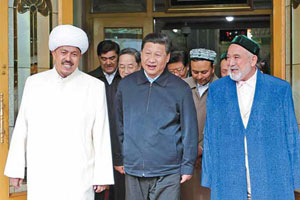
|
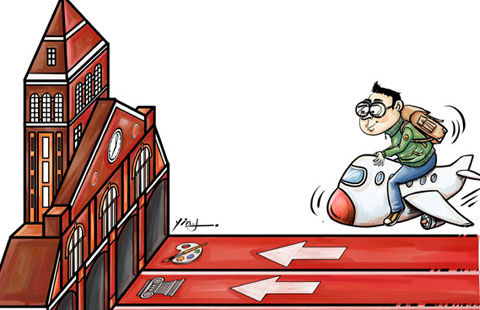
|

|

|

|

|
Today's Top News
Chinese man killed in car crash
China, AU to deepen co-op
Chinese man killed in car crash
Skin rash patients hardest hit by nudity ban
Subsidy to offset rising prices
Ukraine moves forces to Odessa
Disclosure of military secrets becoming bigger risk
Law would raise bar for foster parents
US Weekly

|

|
